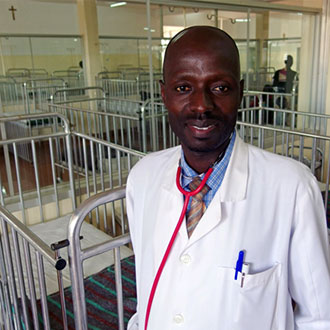
Dr. Richard Nyeko, Chief of Pediatrics, has worked at Lacor Hospital in Uganda for more than a decade. Today IRS and other malaria interventions have reduced the facility’s malaria caseload by more than 90 percent. Credit: Melinda Ojermark, Abt Associates
An Abt Associates-led project in Northern Uganda has helped reduce malaria cases in one hospital by more than 90 percent.
Malaria had always been a tremendous burden at Lacor Hospital, the largest private, non-profit Catholic health facility in Uganda.
In 2009, Malaria was the number one reason children died or were sick and the leading cause of illness in adults. The 482-bed facility, located in Gulu District in Northern Uganda, provided care to more than 219,000 patients in 2013–2014.
In 2009, a project led by Abt Associates – the Uganda Indoor Residual Spraying (IRS) Project Phase II – began conducting IRS in the area. IRS is a highly effective malaria prevention strategy that uses spraying of the interior walls of homes with long-lasting insecticides to kill malaria-transmitting mosquitoes. The project is funded by the President’s Malaria Initiative (PMI) through the U.S. Agency for International Development (USAID).
The number of malaria cases at Lacor Hospital has decreased dramatically in recent years from more than 40,000 in 2009 to approximately 3,200 in 2014. Lacor Hospital used to run out of malaria drugs, but now the hospital shares its oversupply with other health facilities.
Dr. Odong Emintone, Hospital Director, said that before IRS began, 35 to 40 patients tested positive for malaria each day, but “now we see fewer than 10 daily,” he said.
Indoor residual spraying is not the only intervention causing the malaria case reduction at the hospital. Long-lasting insecticide treated mosquito nets, and other measures have also contributed to the dramatic drop in cases.
Aciro Concy, a mother of five, used to spend considerable time and money seeking treatment for malaria for her family at Lacor Hospital. Aciro urges people to take IRS seriously.
“IRS has really brought great improvements in the health of our children. Since I gave birth to my last child one and a half years ago, she has never had malaria. I only bring her to the hospital for vaccinations,” Aciro said as she waited in the outpatient department.
This story was taken from www.abtassociates.com.
